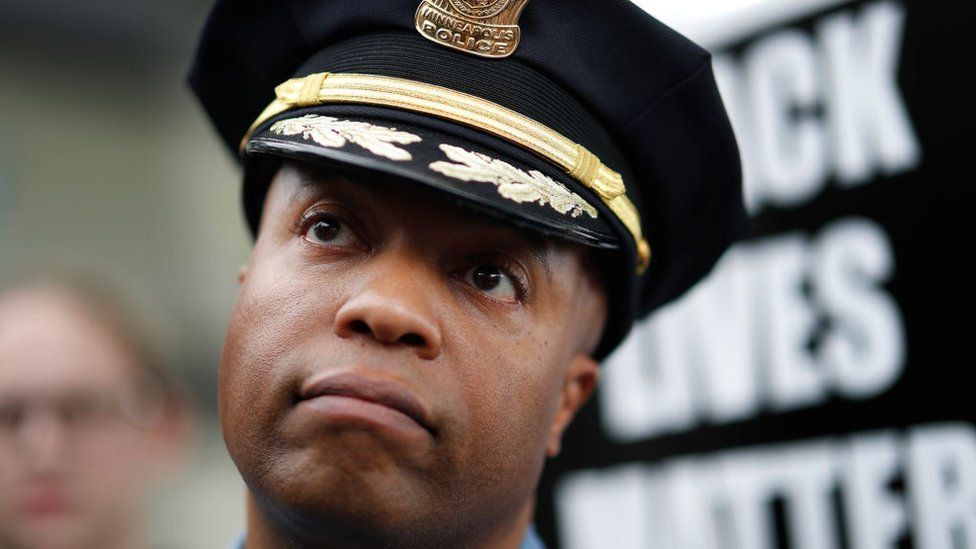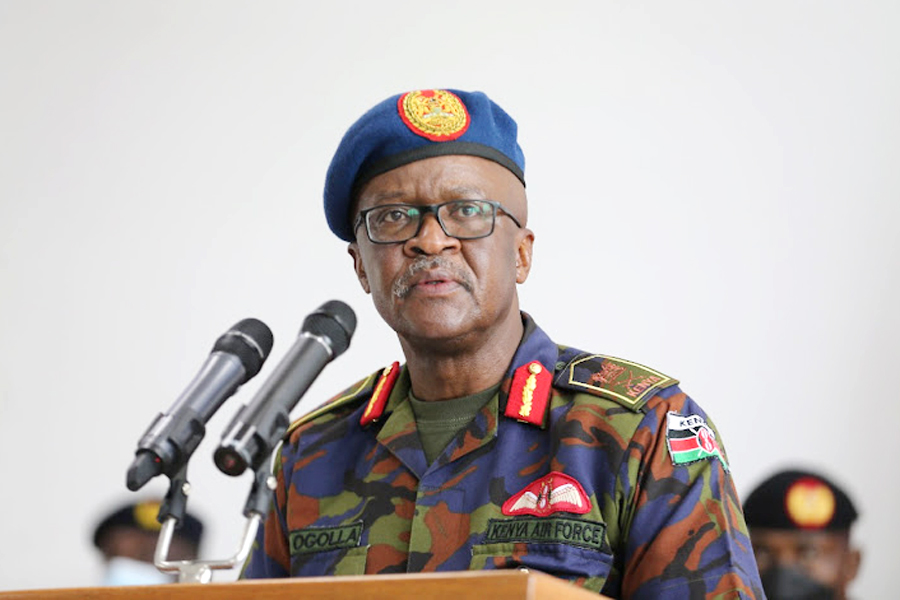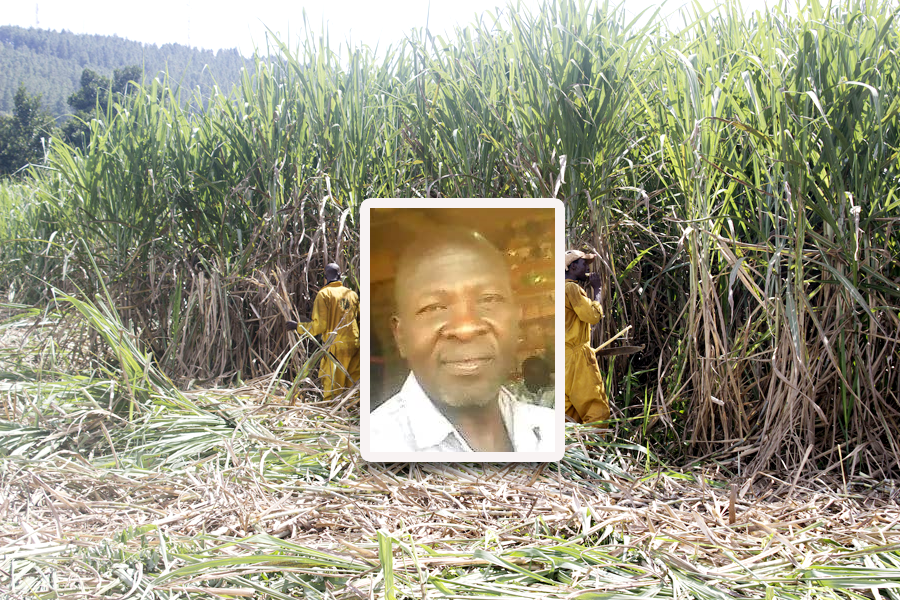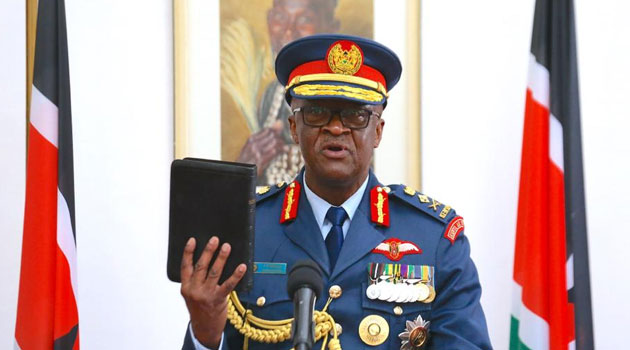Police chief says Chauvin broke force policy in restraining George Floyd
The police chief of Minneapolis has testified that ex-officer Derek Chauvin violated the agency's policy on force during the arrest of George Floyd.
Chief Medaria Arradondo said the way Mr Chauvin restrained Mr Floyd was not in line with training and "certainly not part of our ethics and our values".
The chief had fired Mr Chauvin and the three other officers involved days after Mr Floyd's death last May.
Mr Chauvin is on trial for murder and has denied the charges against him.
Footage of Mr Chauvin, who is white, kneeling on African-American Mr Floyd's neck for more than nine minutes last year sparked global protests against racism.
Monday marks the sixth day in Mr Chauvin's trial, which is expected to last for at least one month.
As police officers are rarely convicted or charged at all for deaths that occur in custody, the verdict in this trial is being seen as an indication of how the US legal system will treat such cases in future.
What did the police chief say?
Prosecutors, who are seeking to prove that Mr Chauvin's actions violated his training, focused their questions on departmental guidelines and strategies taught to help officers de-escalate situations.
Mr Arradondo told the court Mr Floyd should not have been restrained in the manner used by the officers after he stopped resisting, "and certainly once he was in distress".
He said the type of restraint Mr Chauvin, 45, was using came "once there was no longer any resistance and clearly after Mr Floyd was no longer responsive - and even motionless".
"That is, in no way, shape or form, by policy, is not part of our training, and is certainly not part of our ethics and our values."
Mr Arradondo also noted it would be rare for officers to take into custody a suspect accused of passing a counterfeit bill, as Mr Floyd was.
Defence lawyer Eric Nelson questioned Mr Arradondo about officers brandishing a weapon to defuse a situation, as Mr Chauvin did by holding up pepper spray to onlookers.
"Sometimes an officer has to take out his gun, and say hey if you don't listen to me I'm going use force," Mr Nelson said.
The chief agreed it was in line with policy to sometimes gesture in such a way to get a suspect to back down.
When shown different angles of footage of the arrest by Mr Nelson, Mr Arradondo also noted that right before the paramedics arrived, it appeared that Mr Chauvin had shifted his knee onto Mr Floyd's shoulder blade.

Who is Chief Arradondo?
Mr Arradondo joined the force in 1989. He became the city's first African-American police chief in 2017.
Last June, Mr Arradondo said that Mr Floyd's "tragic death was not due to a lack of training - the training was there". He called Mr Floyd's death "murder", and said Mr Chauvin "knew that Floyd was nonresponsive" during the last few minutes.
This is not the first time that Mr Arradondo has testified against a former officer. As assistant chief, he testified against patrolman Mohamed Noor for the killing of Australian woman Justine Damond in 2017.
Earlier in his career, he successfully sued the Minneapolis police department along with four other officers, accusing the force of tolerating discriminatory practices.

The thick blue line
Analysis by Tara McKelvey, BBC News, Minneapolis
Police officers are allowed to use violence; it is part of their job. When a suspect ends up dead, officers are rarely convicted.
Between 2005-2014, only about 40 officers were convicted of murder or manslaughter, according to Bowling Green State University's Philip Stinson, out of thousands of police shootings.
On Monday, prosecutors tried to beat the odds. The appearance of a key witness, Chief Medaria Arradondo, was itself a rarity: he is one of the few police chiefs to speak out against a former officer.
Even with Mr Arradondo's testimony, though, the odds are against the prosecutors.
Jurors understand that police use force routinely, and it is hard to convince them that an officer has crossed a line.

What else happened in court?
On Monday, the court also heard from Dr Bradford Wankhede Langenfeld, who pronounced Mr Floyd dead 30 minutes after he arrived at the Hennepin Country Medical Center.
Dr Lagenfeld said he believes that Mr Floyd's death was caused from a lack of oxygen, called asphyxia.
Prosecutors have suggested that asphyxiation was the cause of Mr Floyd's death - contrasting the ruling of the medical examiner who said Mr Floyd died of "cardiopulmonary arrest", which means a person's heart and lungs have stopped.
Mr Chauvin's defence team has contended that alleged drug use and an underlying heart condition contributed to Mr Floyd's death.
The physician's appearance in court follows testimony from two paramedics who said that Mr Floyd had no pulse and did not appear to be breathing when they arrived at the scene.
Source: BBC













